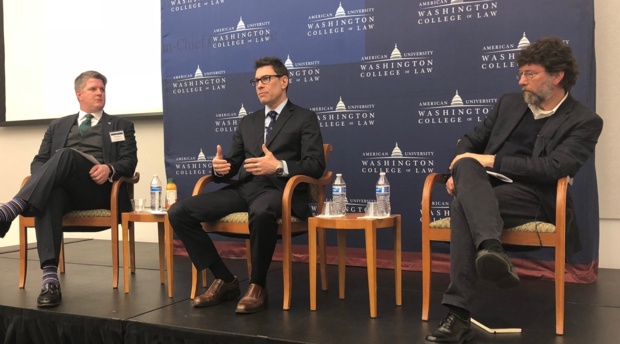
National Security Law Brief Symposium Examines Law of the Sea in Arctic Ocean, South China Sea
March 28, 2018
The Law of the Sea, and how it pertains to the South China Sea and Arctic Ocean, was the topic of discussion during the National Security Law Brief’s biannual symposium held on March 28 at American University Washington College of Law.
The symposium, “Melting Ice, Growing Islands: The Law of the Sea in a National Security Context,” included military, academia, and government officials on one of two panel discussions: “Melting Ice,” the relationship between ongoing ice melt and Russia, Chinese, and American interest and actions in the Arctic Ocean, and “Growing Islands,” a look into Chinese claims over water and trade routes in the South China Sea.
“In the Law of the Sea realm, these are two major geopolitical hotspots because there is a large degree of change in both of them,” National Security Law Brief symposium editor Anthony Bjelke said.
Bjelke said the symposium theme was built around the attendance of keynote guest James Kraska, Chairman and Howard S. Levie Professor in the Stockton Center for the Study of International Law at the U.S. Naval War College in Newport, Rhode Island.
Kraska was interviewed during the symposium by Professor David Hunter, director of the Program on Environmental and Energy Law at AUWCL, and National Security Law Brief Editor-in-Chief Chris White.
While both areas are governed by the United Nations Convention on the Law of the Sea, there is “more institutional buy-in of the rules of International Law, even from Russia” in the Arctic, Kraska said during his keynote interview, while there are “challenges to the legal paradigm in the South China Sea – by China principally – that Russia does not replicate.”
“Russia is more of a status-quo power in the Arctic than in China, where there are efforts to amend and transform concepts of International Law and the Law of the Sea” as it relates to both the East and South China Sea, Kraska said. “The power disparity is more evident in the South China Sea…China has, for most of the last 15 years, held views or positions that are either at variance with the Law of the Sea Convention, or are using terms that are illegal terms, that may only have meaning within China.”
During the “Melting Ice” panel, Dr. John T. Oliver, senior ocean policy advisor for the U.S. Coast Guard, said as the U.S. moves forward with its tourism, scientific research and search of mineral based sources in the Arctic Ocean, it should take a balanced approach.
“As we think about how best to deal with the Arctic, we want to make sure we balance the economic dynamism that is potentially up there, and do in such a way that we protect this garden that is the indigenous peoples’ heritage in that part of the world,” Oliver said.
###